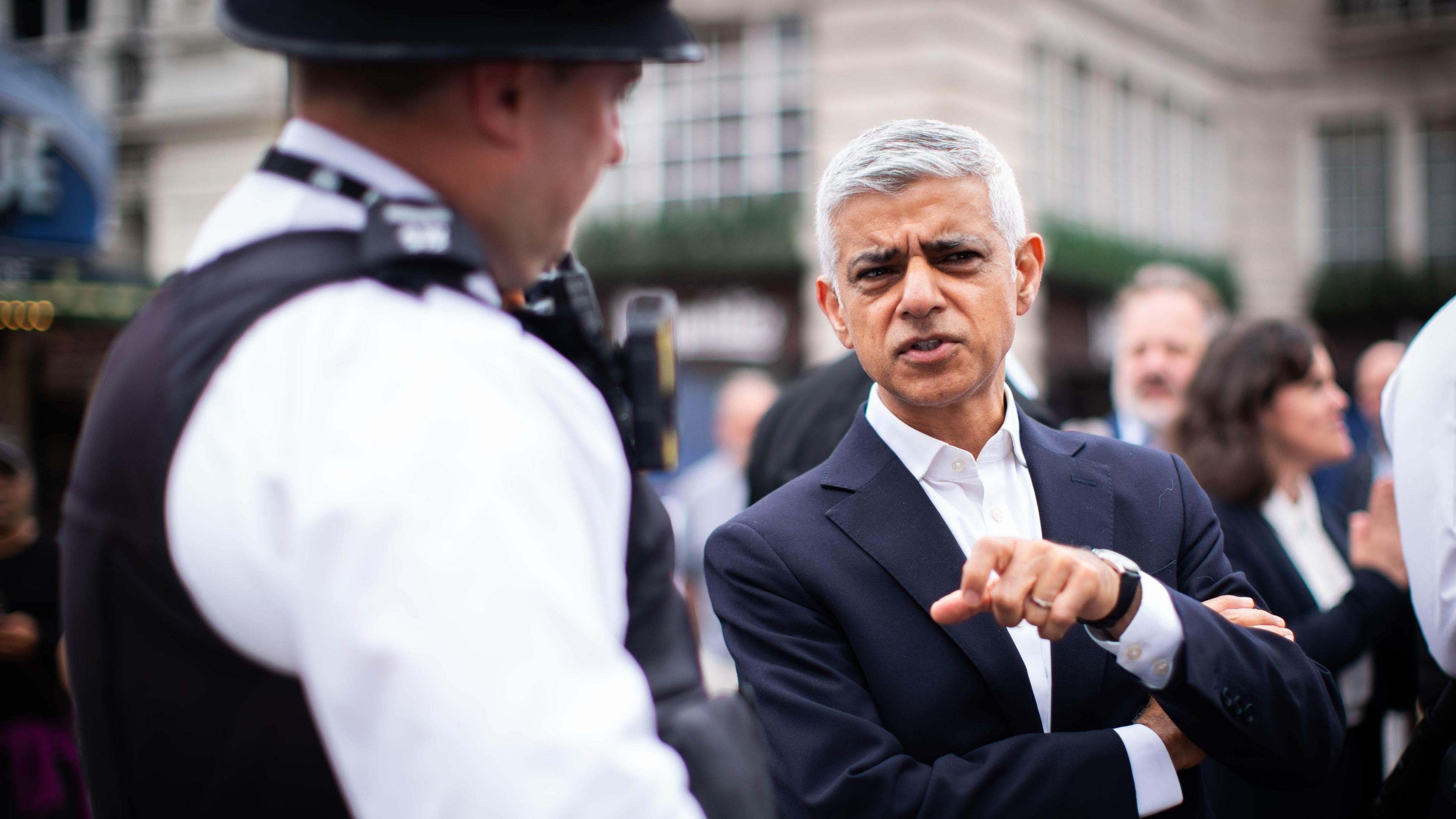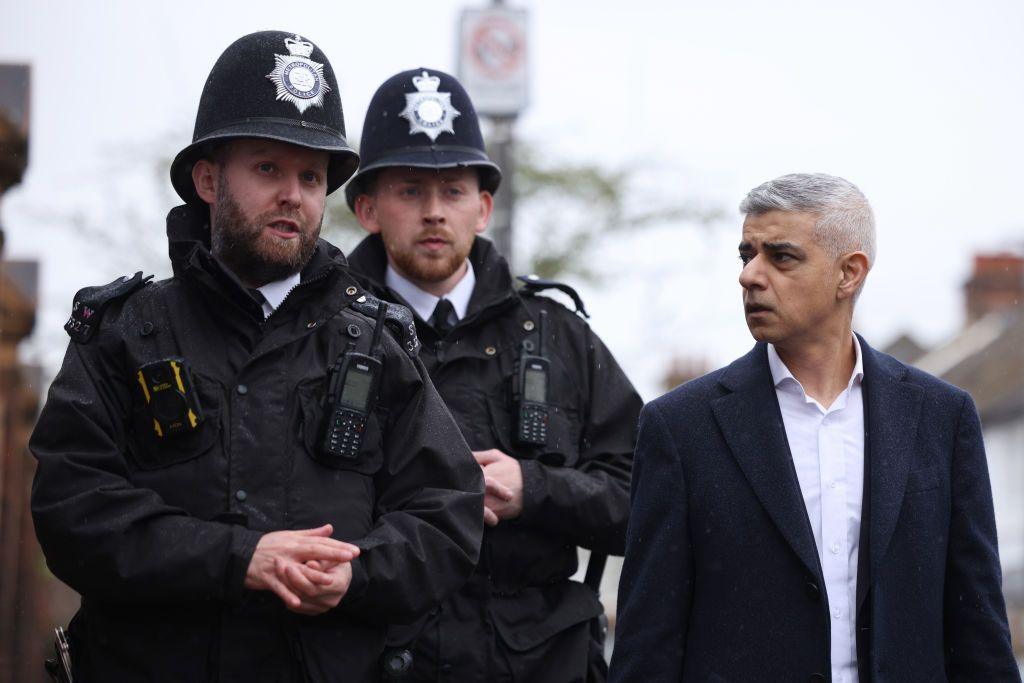Mayor challenges critics over violent crime stats

The mayor says the recorded violent crime drop is "testament" to the work of police officers
- Published
The mayor of London has hit back at politicians "spreading misinformation" about safety in the capital, as new data, external indicated the number of violent crimes had fallen in every borough over the past year.
Figures from City Hall compared the 12 months ending in August 2025 with the previous 12, and suggested there were nearly 9,000 fewer crimes resulting in injury across the capital over that time - a drop of nearly 12%.
Earlier this month, US President Donald Trump accused Sir Sadiq Khan of doing a "terrible job", adding that "crime in London is through the roof".
The Tories rejected the idea that the capital was safer, claiming the figures were "cherry-picked" by the Labour-run London Assembly.
'Incredible work'
Sir Sadiq said "the evidence was clear" the current approach to tackling crime is working.
"Violent crime with injury is down in every single London borough and that is testament to the incredible work of our brave police officers.
He said police were arresting 1,000 additional suspects each month, and prevention work led by London's violence reduction unit, external had delivered more than 450,000 positive opportunities and activities to divert young people away from violence and exploitation.
Mayor invests £2m in activities to reduce youth crime
- Published29 July 2024
Analysis: Sonja Jessup, BBC London home affairs correspondent
How do you measure how safe London is? Which offences should you focus on?
Is it the perception of Londoners - do they feel protected in their community, or have they have changed their behaviour due to fear?
The mayor points to the fall in the recorded number of people being injured through violent crime and the drop in homicide, including teenage homicide.
The Tories highlight wider knife crime offences which have risen, and criticise the low rate of robberies solved.
But what do we take from the statistics and who should we trust to interpret them?
Is social media having a significant impact? What does a viral video of a knife attack or an online commentary do to perception?
Is it their own experience, or that of their family and friends, that really matters?
The narrative becomes even more significant for the mayor at a time when the Met is preparing to make cuts to officers, staff and services, to save money.
Figures show fall in some crime, says London mayor
- Published12 August
Speaking at the Labour Party conference, Sir Sadiq said: "I've been mayor now for nine years and over the last 14 years before the Labour government, I've had to deal with, year-on-year, of austerity, cuts to our police, cuts to youth clubs, cuts to youth workers.
"At a time when politicians and pundits are talking down our city, I think it's really important we talk up our city based upon the evidence.
"The evidence is violent crime with injuries down in every single borough across our great city."
Met Police to close half its front desks following budget cuts
- Published17 July
Violence against women and girls rises in London
- Published12 March
The rate of homicide was at a 10-year low, comparing the 12-month period to June this year compared with the 12-month period leading up to May 2016.
Sir Sadiq said that "one death and one crime will always be too many" and that City Hall is working with the government to "build on this progress".
Metropolitan Police Assistant Commissioner Rachel Williams said the force was targeting the most dangerous individuals, disrupting criminal networks, and investing in prevention to protect those most at risk.
"That's why fewer people are being hurt, fewer lives are being lost, and London is becoming a safer city," she said.

Ahead of the 2024 London mayoral election Sadiq Khan pledged to increase the number of neighbourhood and community support officers on the street
But shadow home secretary Chris Philp said: "Sadiq Khan seems to be the only person who thinks there is no crime problem in London.
"He cherry-picks his numbers and hopes Londoners will forget the reality that knife crime is up 86% on his watch, external, stop and search collapsed by more than half, and London now accounts for nearly half of all knife-point robberies in England.
"Under this Labour mayor, criminals know the odds are stacked in their favour.
"Only one in 20 robberies is solved, fewer offenders are being jailed, and more than 1,000 police officers have been cut from the Metropolitan Police, with Sir Mark Rowley warning of further losses this year.
"Londoners don't feel safer because London isn't safer."
The data also indicated Londoners were less likely to be a victim of violent crime than across the rest of England and Wales.
While all of the capital's 32 boroughs have seen a reduction, Havering in east London recorded the largest drop, with such crimes down by 16.3%, followed by Enfield in north London where they fell by 16.1%.
Greenwich saw the smallest decrease with 4.3%, followed by Kensington and Chelsea with a drop of 4.6%.
The figures released by City Hall refer to violent crimes that result in injury, so knifepoint robberies without injury, for example, are not included.
Listen to the best of BBC Radio London on Sounds and follow BBC London on Facebook, external, X, external and Instagram, external. Send your story ideas to hello.bbclondon@bbc.co.uk, external